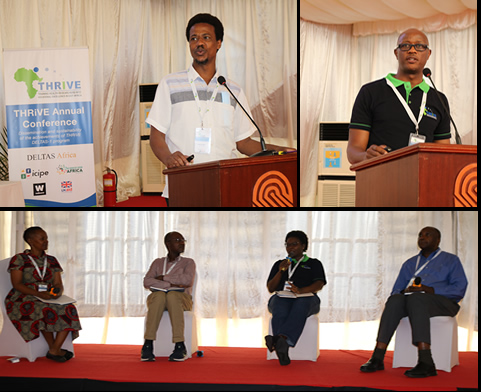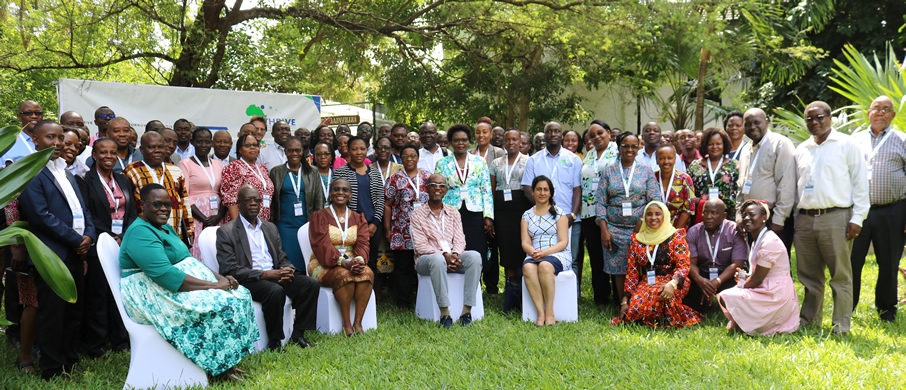RACHEAL NINSIIMA
In the past, THRiVE’s annual conferences have served as an important forum for research scientists to discuss and exchange original research on infectious, zoonotic and non-communicable diseases. This year’s conference held between August 29 and September 1 at Serena Beach Resort in Mombasa recorded some firsts. For the first time, THRiVE held a preconference to enrich participants with skills and knowledge on how to close-out a grant. The preconference was held on August 27 and 28 and blended various topics such as best practices of grant closeout; closeout checklist; final financial reporting and monitoring, evaluation and learning. These sessions were led by a team from Science for Africa Foundation (SFA).
The main conference, held under the theme; ‘Dissemination and sustainability of the achievements of THRiVE DELTAS-1 Program’, offered participants both an in-person and virtual experience. Day one began with a keynote address from Dr. Elizabeth Bukusi, the former Deputy Director of the Kenya Medical Research Institute (KEMRI). She offered insights on how to achieve collaborative research in a global environment in her address titled; ‘How to eat an elephant.’ Here, she touched on the importance of mentorship in order to build a critical mass.
“As research scientists, you ought to know yourself, find your calling and build a critical mass of mentors. If you need a mentor, go out there and get one. Luckily virtual space has eased this,” Dr Bukusi said.
Her talk was followed by another from Dr. Tom Kairuki, the Executive Director of Science for Africa Foundation and guest of honor. He highlighted new areas that funders are aiming to finance and these include: anti-microbial resistance; data science; drug discovery and clinical trials. Although the DELTAS-1 grant has ended for THRiVE, Dr. Kairuki pledged for SFA to leverage THRiVE-2 experts in lending an African voice to global science.
NOTABLE PRESENTATIONS
Throughout the week, institutional co-applicants, postdoctoral, doctoral and career development fellows made various presentations. The co-applicants spoke to the achievements of THRiVE in their partner institutions. For example, Dr. Geoffrey Tabo of Gulu University noted that over 15 publications had been published by the five career development awardees whereas Dr. Gerry Mshana, the co-applicant of National Institute for Medical Research (NIMR)-Mwanza observed that THRiVE had supported purchase of lab equipment and connecting the institution to the national fibre optic network. At Kilimanjaro Christian Medical University College (KCMUCo) THRiVE facilitated the development of several policies such as the Data Security and Anti Bribery Policies.
 Thirty-two scientific presentations on fellow’s research and career progression were made. Numerous fellows spoke of publications from their research; career milestones and network collaborations. For example, Prof. Moses Galukande, a postdoctoral fellow from Uganda, told participants that he had won 10 other research grants since he joined THRiVE in 2017 and is in the process of establishing the first Uganda Breast Society, a platform to advance breast health research and practice. Another, Dr. Joel Bargul from Kenya said he had co-authored 30 peer reviewed articles since 2017 and won seven research grants. For Dr. Denna Michael Mkwashapi, a PhD fellow based in Tanzania, he was recently promoted to the post of Senior Research Officer at NIMR and made honorary lecturer at the Catholic University of Health and Allied Science (CUHAS).
Thirty-two scientific presentations on fellow’s research and career progression were made. Numerous fellows spoke of publications from their research; career milestones and network collaborations. For example, Prof. Moses Galukande, a postdoctoral fellow from Uganda, told participants that he had won 10 other research grants since he joined THRiVE in 2017 and is in the process of establishing the first Uganda Breast Society, a platform to advance breast health research and practice. Another, Dr. Joel Bargul from Kenya said he had co-authored 30 peer reviewed articles since 2017 and won seven research grants. For Dr. Denna Michael Mkwashapi, a PhD fellow based in Tanzania, he was recently promoted to the post of Senior Research Officer at NIMR and made honorary lecturer at the Catholic University of Health and Allied Science (CUHAS).
Other notable presentations included one on open science by Caleb Kibet, a bioinformatician at the International Centre of Insect Physiology and Ecology (icipe) and a personal experience of having a bioinformatics career in limited resource settings by Dr. Gerald Mboowa, an implementation science expert for bioinformatics at Africa CDC.
All presentations were lauded. Intermittently, 12 short documentaries on fellows’ scientific research; community engagement and women in science were displayed.
On the final day to mark the conference’s closing, a panel discussion comprising of top research scientists in East Africa was held. Speakers were: Dr. Daniel Masiga, Principal Research Scientist and Head of the Human and Animal Health Theme at icipe; Prof. Dr Annette Nakimuli, Dean School of Medicine – Makerere University and Dr Saidi Kapiga, Scientific Director, Mwanza Intervention Trials Unit (MITU). It was moderated by Dr. Tabitha Mwangi, Programme Manager at Cambridge Africa. Discussions focused on the importance of mentorship to an early career scientist; motivating factors for these top scientists to come to work daily and lessons learned during their research careers.
“The center of gravity for African science has shifted and this is the best time to be a scientist. But remember, behind every good scientist is a good-able mentor. So go out there and get yourself a good mentor!” Prof Nakimuli said, responding to why it is important for scientist to be mentored.
On what motivates him to come to work daily, Dr. Masiga said;
“I come in order to find solutions to local problems that do not necessarily need donor funding.”
Reflecting on the past five years of the DELTAS-1 funding, Prof Sewankambo, Director – THRiVE, closed the conference by encouraging participants to further push their research work to different publics and ensure that the THRiVE brand remains. The conference brought together over 80 participants from Uganda, Kenya and Tanzania.

